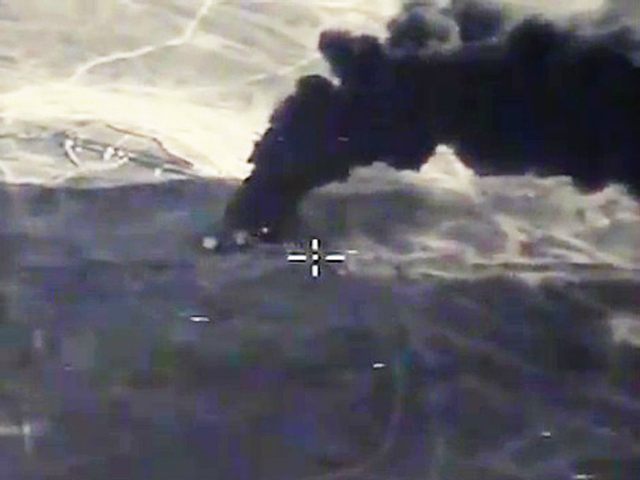The U.S. led coalition currently fighting Islamic State (ISIS) has slashed the organization’s revenues by over 90 percent over the past two years, according to statistics provided to USA Today.
The statistics reveal that oil production in the caliphate’s major strongholds of Iraq and Syria has dropped to a new low of under $4 million a month. ISIS was making $50 million a month two years ago after the group swept through regions seizing dozens of lucrative oil refineries, including the Bayji refinery in Iraq and the oil-rich Deir al-Zour region in eastern Syria.
Coalition forces began a campaign designed to deplete ISIS’s oil revenues back in 2015, known as Operation Tidal Wave II, and have since destroyed over 2,500 ISIS-owned tanker trucks, dozens of mobile refineries and other oil infrastructure operated by the group.
“The coalition has regularly conducted strikes against ISIS and their oil production capabilities to degrade their ability to generate revenue from oil resources and facilities,” the coalition said in a statement.
Another faction battling to retake oil refineries is the Syrian Arab Army, which last month reclaimed significant territory, including an oil field, with the support of Russian forces.
The statistics are another sign that the coalition is winning the war against ISIS, given that oil revenues account for over half the organization’s total revenue, alongside looting campaigns on banks and extorting cash from civilians in occupied cities.
Meanwhile, a report in May also found that the U.S.-led coalition had increased the number of airstrikes against ISIS by 50 percent over the course of 2017, as it seeks to fully incapacitate the terrorist organization.
In May, Defense Secretary James Mattis credited Donald Trump with the coalition’s success, citing factors such as giving greater responsibility to battlefield commanders and the loosening of Obama-era rules of engagement that some in the military claimed amounted to micromanaging military activity.
“He has delegated authority to the right level to aggressively and in a timely manner move against enemy vulnerabilities,” Mattis said in May.
In July, Iraq and the U.S. coalition also celebrated the complete liberation of Mosul from the Islamic State following a violent months-long campaign, although much of the city now lies in ruins, thousands dead and wounded, while nearly a million people were forced from their homes.
Follow Ben Kew on Facebook, Twitter at @ben_kew, or email him at bkew@breitbart.com.

COMMENTS
Please let us know if you're having issues with commenting.